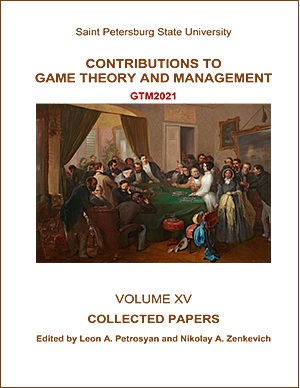Concept of Social Value Orientation in Measuring Cooperative Behavior Incentive in Games
DOI:
https://doi.org/10.21638/11701/spbu31.2022.19Abstract
The purpose of this study is to explore the effects and mechanisms of cooperation indicators such as interpersonal trust, social preferences, and social value orientations on cooperative behavior, and we develop a psychologically grounded model of trust-based cooperation. Some accounts of cooperation in product choice games have focused on developing simple indicators of game severity i.e., the extent to which the game facilitates noncooperative choices that are derived exclusively from the game's payoff structure. However, this approach does not provide a clear explanation of the psychological mechanisms why the game's payoffs affect the rate of cooperation. When considering individuals' social preferences and positive expectations (beliefs) for how to predict the emergence of trust-based cooperation as an expected utility maximizing strategy, we show a simple decision model for trust-based cooperation. In addition, we show how these predictions are associated with a game-specific cooperation index. We then describe under what conditions trust-based cooperation is rationalizable and how trust-based decisions can be understood through the interplay between of payoffs, preferences, and beliefs.
Keywords:
product choice game, cooperative behavior, K-index, social preference, trust, social value orientation
Downloads
References
Downloads
Published
How to Cite
Issue
Section
License
Articles of "Contributions to Game Theory and Management" are open access distributed under the terms of the License Agreement with Saint Petersburg State University, which permits to the authors unrestricted distribution and self-archiving free of charge.




